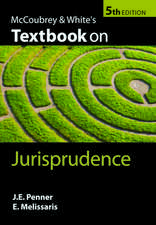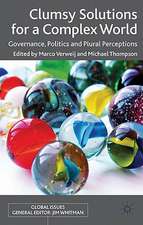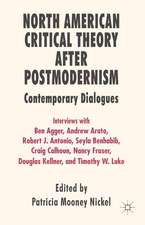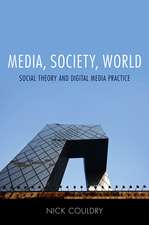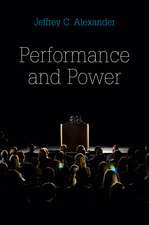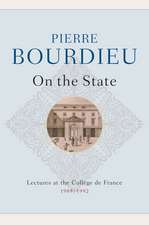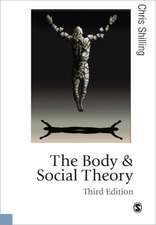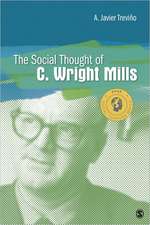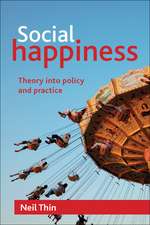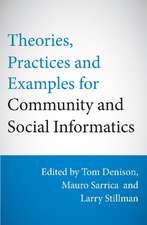The Triumph and Tragedy of the Intellectuals: Evil, Enlightenment, and Death
Autor Harry Redneren Limba Engleză Hardback – 30 noi 2016
In this fascinating study, Redner demonstrates how secularization took the sting out of both the dread and promise of an afterlife and intellectuals learned to die without the hope of immortality popularized by philosophy and religion. Ultimately, they produced the ideologies that generated the totalitarian regimes of the twentieth century, which subsequently exterminated these intellectuals through mass murder on a scale never before experienced. The book traces the sources of this fatal entanglement and goes on to examine the contemporary condition of intellectuals in America and the world.
Wherein lies the future of the intellectuals? Redner suggest that in the present state of globalization, dominated by technocrats, experts, and professionals, their fate remains uncertain.
Preț: 766.26 lei
Preț vechi: 1103.97 lei
-31% Nou
Puncte Express: 1149
Preț estimativ în valută:
146.62€ • 152.79$ • 121.40£
146.62€ • 152.79$ • 121.40£
Carte tipărită la comandă
Livrare economică 03-17 aprilie
Preluare comenzi: 021 569.72.76
Specificații
ISBN-13: 9781412864107
ISBN-10: 1412864100
Pagini: 340
Dimensiuni: 152 x 229 x 23 mm
Greutate: 0.57 kg
Ediția:1
Editura: Taylor & Francis
Colecția Routledge
Locul publicării:Oxford, United Kingdom
ISBN-10: 1412864100
Pagini: 340
Dimensiuni: 152 x 229 x 23 mm
Greutate: 0.57 kg
Ediția:1
Editura: Taylor & Francis
Colecția Routledge
Locul publicării:Oxford, United Kingdom
Cuprins
Preface
Introduction
Part I: Evil and the Tragedy of the Intellectuals
1 How Intellectuals Arrived at Radical Evil
Section I—From Ideologies to Exterminism
Section II—From Ideals to Ideologies
Section III—From Philosophy to Revolution
2 The Psychology and Sociology of Radical Evil
Section I—Intellectual Hatred Is the Worst
Section II—The Victimization Process
Section III—How to Succeed by Evil Means
3 On How to Judge Radical Evil Doers
Section I—A Reading of Pascal
Section II—Historical Varieties of Evil
Section III—On a Fortuitous Misreading of Kant
Section IV—Pascal's Premonition of Radical Evil1
Part II: Enlightenment and the Triumph of the Intellectuals1
4 The Varieties of Intellectuals in Europe
Section I—Intellectuals in General
Section II—Intellectuals and the Enlightenment
Section III—Intellectuals in France
Section IV—Intellectuals in Germany and Russia
Section V—Intellectuals in England and Scotland
5 The Intellectualization of the World
Section I—Intellectualization of Politics,
Philosophy, and Religion
Section II—Intellectualization of Morals
Section III—Intellectualization of the Arts
6 The Fall of the Intellectuals in Europe and America
Section I—Pride before the Fall
Section II—The Last of the Intellectuals
Section III—New World Intellectuals
Section IV—Intellectuals and Technocrats
Part III: Death and Afterlife
7 Death in History
Section I—The Death of Hume
Section II—Representations of Death throughout the Ages
Section III—Borkenau and Freud
8 De-demonization and Democracy
Section I—Plato and Paul and the Devil Himself
Section II—The Birth of Democracy from the
Spirit of Enlightenment
9 The Many Faces of Death
Section I—Mass Mechanical Death
Section II—Modern Death and the Afterlife
10 The Return of the Intellectuals
Section I—Intellect and Intelligence
Section II—Generalist Intellectuals
Index
Introduction
Part I: Evil and the Tragedy of the Intellectuals
1 How Intellectuals Arrived at Radical Evil
Section I—From Ideologies to Exterminism
Section II—From Ideals to Ideologies
Section III—From Philosophy to Revolution
2 The Psychology and Sociology of Radical Evil
Section I—Intellectual Hatred Is the Worst
Section II—The Victimization Process
Section III—How to Succeed by Evil Means
3 On How to Judge Radical Evil Doers
Section I—A Reading of Pascal
Section II—Historical Varieties of Evil
Section III—On a Fortuitous Misreading of Kant
Section IV—Pascal's Premonition of Radical Evil1
Part II: Enlightenment and the Triumph of the Intellectuals1
4 The Varieties of Intellectuals in Europe
Section I—Intellectuals in General
Section II—Intellectuals and the Enlightenment
Section III—Intellectuals in France
Section IV—Intellectuals in Germany and Russia
Section V—Intellectuals in England and Scotland
5 The Intellectualization of the World
Section I—Intellectualization of Politics,
Philosophy, and Religion
Section II—Intellectualization of Morals
Section III—Intellectualization of the Arts
6 The Fall of the Intellectuals in Europe and America
Section I—Pride before the Fall
Section II—The Last of the Intellectuals
Section III—New World Intellectuals
Section IV—Intellectuals and Technocrats
Part III: Death and Afterlife
7 Death in History
Section I—The Death of Hume
Section II—Representations of Death throughout the Ages
Section III—Borkenau and Freud
8 De-demonization and Democracy
Section I—Plato and Paul and the Devil Himself
Section II—The Birth of Democracy from the
Spirit of Enlightenment
9 The Many Faces of Death
Section I—Mass Mechanical Death
Section II—Modern Death and the Afterlife
10 The Return of the Intellectuals
Section I—Intellect and Intelligence
Section II—Generalist Intellectuals
Index
Descriere
This fourth instalment of Harry Redner's tetralogy on the history of civilization argues that intellectuals have a brilliant past, a dubious present, and possibly no future. He demonstrates how secularization taught intellectuals to die without the hope of immortality popularized by philosophy and religion. Ultimately, they produced the ideologies that generated the totalitarian regimes of the twentieth century, which subsequently exterminated these intellectuals through mass murder on a scale never before experienced. The book traces the sources of this fatal entanglement and goes on to examine the contemporary condition of intellectuals in America and the world.

